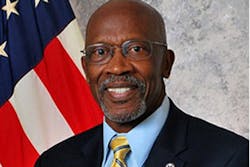Officials Tout Importance of USFA Re-Authorization
While outlining the priorities of the USFA to legislators Thursday morning, Administrator Ernest Mitchell said his agency has much more work to do to support the nation's fire and emergency responders.
Mitchell told the Committee on Science, Space, and Technology Subcommittee on Technology and Innovation: "The combined efforts of USFA and fire service stakeholders have contributed to a decline in fire-related deaths through public safety education, fire prevention inspections, fire code initiatives, and installation of smoke alarms and residential sprinkler systems."
The budget authorization for the USFA, established after the America Burning report of 1973, is set to expire on Sept. 30. Over the past several years, the agency's spending plan has been cut significantly.
During the hearing, Mitchell and other fire service officials explained the important role the USFA plays not only in training leaders, but promoting fire prevention, supporting research initiatives, and preparing crews for all-hazard responses.
The IAFF even suggested the name be changed to the "U.S. Fire, EMS and All-Hazards Administration."
Michell told the panel that his priorities include:
* Reduce risk at the local level through prevention and mitigation. The USFA is working to establish national models for state and local risk reduction, prevention, mitigation, and safety strategies while encouraging code development, compliance, safe building design, and infrastructure resilience.
*Improve local planning and preparedness. The effectiveness of an incident response handled at the local level is a direct result of the preparedness of the local responders. The USFA is working to set the standard for local fire and emergency services throughout the country.
* Improve the fire and emergency services' capability for response to and recovery from all hazards. The USFA is working to ensure that best practices and training at the local level keep incidents from escalating to a state or national response.
* Improve the fire and emergency services' professional status. The USFA is working to promote a nationally-accepted competency-based system of professional development that can be completed in conjunction with state and local partners.
* Lead the Nation's fire and emergency services by establishing and sustaining USFA as a dynamic organization. The USFA is continuing work towards its vision of being recognized as "America's Fire and Emergency Services Leader."
Dr. John Hall, director of NFPA's Fire Analysis and Research Division, touted the USFA's accomplishments to reduce the number of firefighter and civilian injuries and deaths in the past 40 years.
He added that the NFPA has worked closely with USFA officials on a number of projects including data collection and research.
"We urge you to provide requested funding for the USFA, for its research program, the Academy's training program, the grants programs, and NFIRS. The taxpayers get more value from a dollar spent with the USFA than at many other agencies and, if truth be known, many private organizations as well," Hall told legislators.
Chief Jim Critchley, president of the Western Fire Chiefs Association, said the USFA has made a difference for both small and large departments even though their budget has been reduced by 25 percent over the last decade.
He went over various projects, initiatives and courses hosted by the USFA, and spoke of the importance for them to continue.
"These cuts would cancel the final stages of the NFIRS modernization plan and eliminate the ability of local fire departments to get real-time information from the system. In addition, the cuts would force the USFA to reduce funding for its wildland fire programs, including its efforts to help communities in the wildland-urban interface. They also would eliminate courses at the NFA, discontinue programs to promote fire prevention for children, and end programs that support the use of fire sprinklers in residential homes," he said.
The assistant to the general president of the IAFF, Kevin O'Connor, said the USFA needs to be re-authorized and fully funded to accomplish a myriad of missions it has undertaken.
He went on to say Congress should consider re-naming the USFA to reflect all those entities it tackles.
"The USFA of the 21st century must reflect the all-hazards role and mission of the 21st century fire service.
While USFA must continue to integrate all-hazards training and preparedness into its programs and policies, it must also work to change the perception that it is solely focused on fire. The unfortunate reality is that USFA's all-hazards role is not widely recognized. For example, organizations and policymakers have long bemoaned the lack of a "home" in the federal government for EMS, and have advocated the creation of a new entity modeled on USFA but devoted to EMS issues -- a proposal which we believe to be duplicative and counterproductive."
